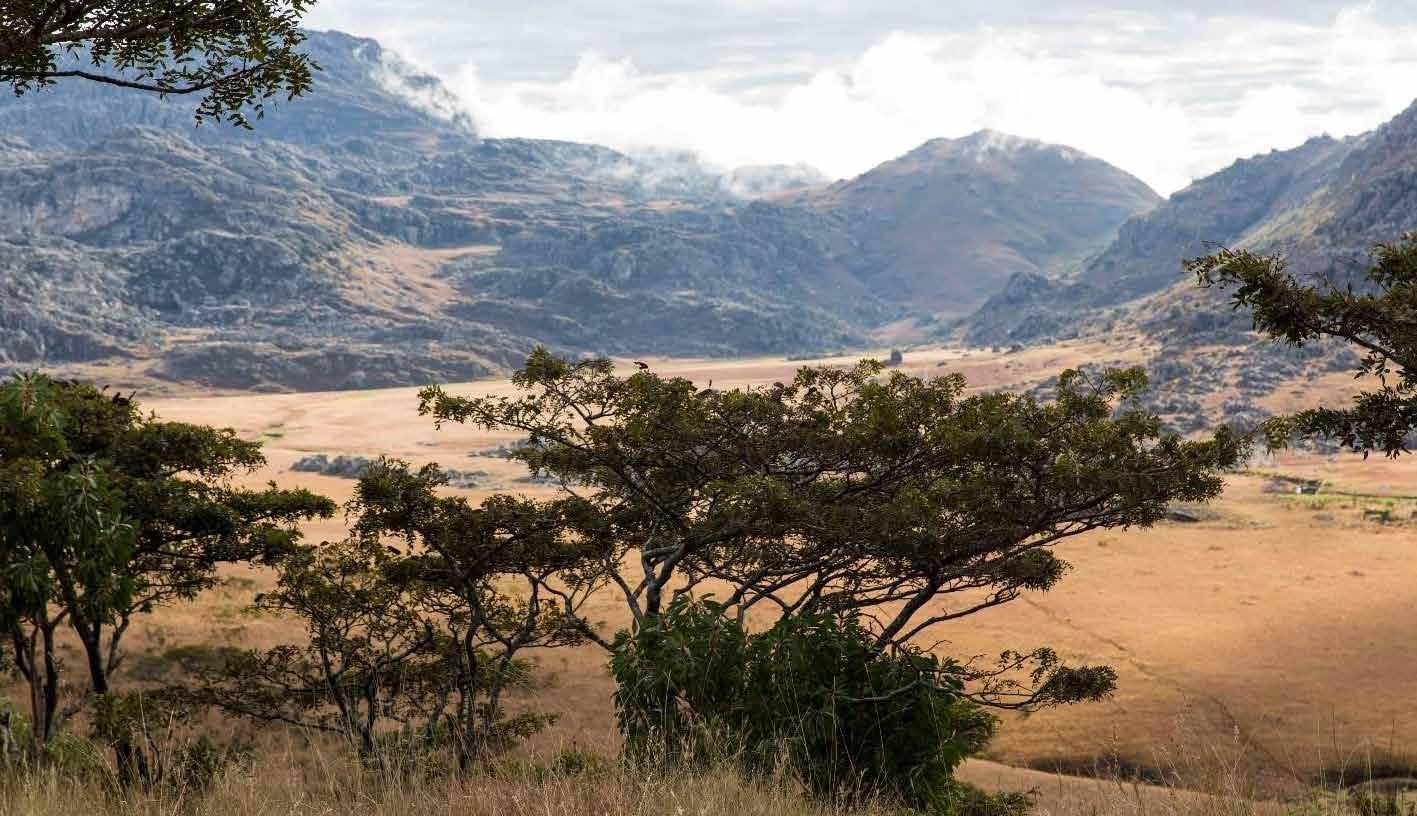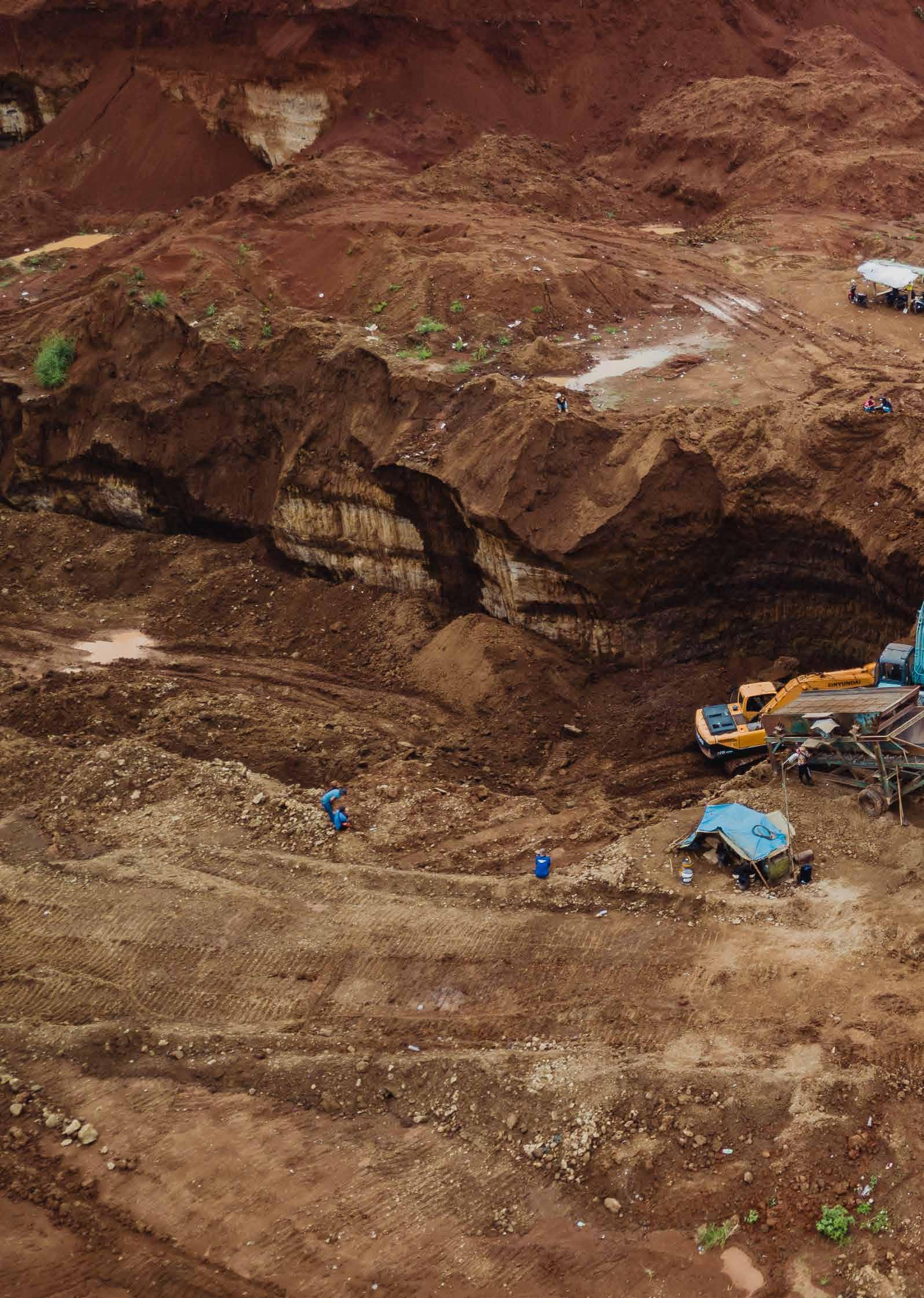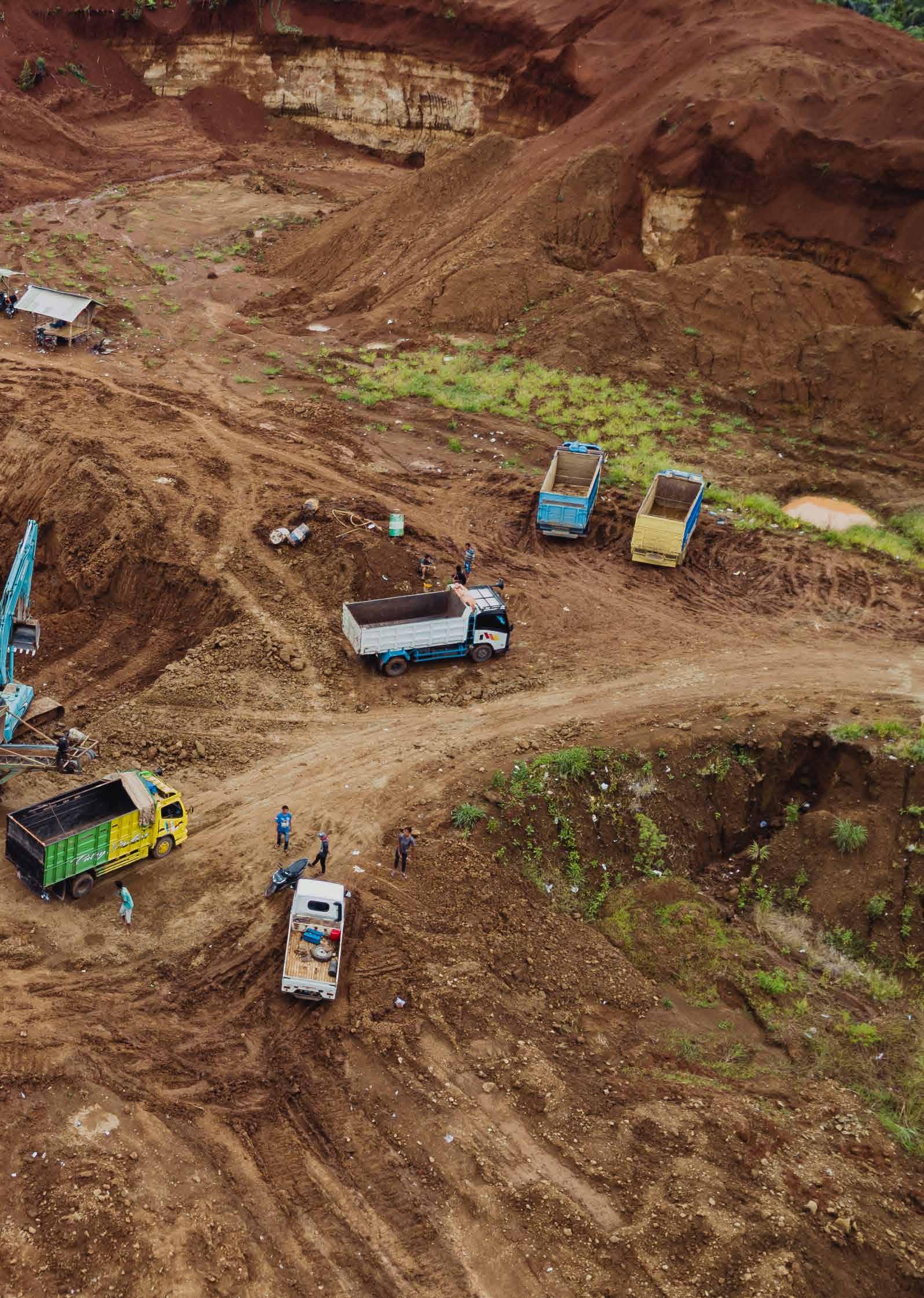
7 minute read
Unauthorized Mining Practice (PETI) During the Pandemic
Unauthorized Mining Practices (PETI) During The Pandemic
Muhammad Alif Ikhsan 12118018
Advertisement
Image source : www.effective-states.org
COVID-19 is a disease caused by the latest coronavirus named SARS-CoV-2. WHO first found this virus on 31 December 2019, following the reports on an emerging cluster of pneumonia cases on Wuhan people, People’s Republic of China. According to WHO’s data, about 80% patients may recover without medical treatment, while 15% are severely exposed and require oxygen aids, and 5% are exposed quite severely and require intensive treatment. Because of the very rapid spread, many countries throughout the world perform various methods to stop this virus from spreading, one of which is through regional quarantine (lockdown). Regional quarantine is a method taken by a region to control its people to stay at home. This aims at suppressing their movement and activities including working, going to school, etc. This causes economic recession to occur almost in all countries in the world, loss of employment which causes unemployment, scarcity of food, and even increased crimes. One of the crimes arising and emerging during COVID-19 pandemic is unauthorized mining practice (PETI). Unauthorized mining practice is a mining activity performed without legal path such as application for land right status, mining license, and other licenses. The lack of expertise and mastery in mining engineering causes negative impact arising from this illegal mining, such as water and soil contamination because of the sue of hazardous and toxic materials (B3), ecological damage because of deforestation, economic loss to the state because of loss of source of tax and royalty, and dissatisfaction/no post-mining treatment and reclamation of ex-mining land. Many illegal mining practices occur in the following countries
Zimbabwe
Chimanimani Mountains in the east of Zimbabwe is a place visited by many tourists. It boasts fertile land with green grassy plain and beautiful waterfall behind a dense forest. However, Covid-19 emerging from the end of 2019 changes it entirely. The travel ban enforced by many countries, including Zimbabwe, in order to stop this virus from spreading has caused tourists cease
visiting this location.However, because of declining number of tourists visiting, hundreds of illegal gold miners take this place over. The increasing number of illegal miners leaves the nature of Chimanimani Mountains damaged. The gold deposit in the Chimanimani National Park area exists on the range of hills dominated by sandstone and quartzite. River flow causes rocks to weather and leaves alluvial gold deposit along its flow. The damages it causes are in the form of water pollution because of the use of mercury for gold washing, decreasing biodiversity because of damaged habitats of plants, birds, and endemic animals, and established camp in the mining area causes accumulation of domestic waste in the national park area. There are some factors causing illegal mining practices to emerge in the area, namely: 1. It has suffered economic crisis for the last decade, worsened by hyperinflation (up to 175% in the mid-2019). 2. Severe dryness takes place in many places of the country. According to UN World Food Programme (WFP), Zimbabwe will suffer food scarcity by the end of February 2020, leading to threatened starvation of its 7.7 population. 3. COVID-19 pandemic occurring in Zimbabwe worsens the existing crisis. Besides, declining number of tourists visiting the Chimanimani National Park is taken advantage of by the people to exploit its gold deposits. 4. There is an indication of intervention of rangers assigned by the Zimbabwe Parks and Wildlife Management Authority in coordinating the illegal mining practices at the Chimanimani National Park location. Miners are required to collect 40 gram of gold per day which will be taken by the rangers for US Dollar. The government of Zimbabwe has taken some measures to prevent the illegal mining practices, including registering some illegal gold miners for them to have mining license. The government has also inspected the mining location and caught tens of illegal miners. However, this leads to new problem in the form of human rights abuse in the form of firing and kidnapping cases by the “law enforcers’ in duty.

Unauthorized Mining Activities in Zimbabwe

Indonesia
Coronavirus also hits our country, Indonesia. With the first case registered in March 2020, the government has gradually applied the Large-Scale Social Restriction (PSBB) in order to hold the increasing number of COVID-19 positive patients down. This affects the Indonesians’ economy because of the restriction on many activities, including temporary closure of workplace and restriction on activities at public space. The economic impact is also felt by the global society. The worldwide society’s fear for possible global economic downfall causes investors and speculators throughout the world to buy gold (commodity deemed to protect economic instability). The increasing demand for gold makes gold price to soar up to Rp1,056,000 per gram (Antam). This is taken advantage of by the society in Indonesian rural areas to mine gold illegally in areas deemed to have high gold content. The river flow around the Grasberg site under the coverage of PT Freeport Indonesia becomes one of the destinations of the illegal miners. The gold in the river flow is still mixed in the mud, separated using simple filter mad of fabric. In one day, they may collect about 1 gram gold, that will be valued at Rp800,000, which is certainly tempting for the surrounding people. The dangers threatening the illegal miners are not only from possible exposure to the virus amidst the pandemic, but also from exposure to other diseases, particularly skin disease since they work on river flow containing mining waste of PT Freeport Indonesia. In addition, there is also a threat from the rebel (OPM) in their guerrilla operation in the forest and possible arrest by local security authority. Besides in the depth of Papuan forest, illegal mining is also performed by West Kalimantan people. Because of economic difficulty, the people turn to be gold miner on the rivers of their area. The environmental damage caused by the illegal mining is in the form of water contamination because of the use of mercury for gold refinement that has actually been banned in Indonesia from 2017. The rivers also serve as the source of water for people living along the place where the rivers flow, causing potential disease in case of people’s exposure to it. In the last September, the police successfully caught about 400 illegal gold miners operating in Kalimantan, who were subject to maximum 15 years of imprisonment.
Peru
Not far different from the condition in Indonesia, people of Peru who are still under the shadow of the economic crisis because of the Covid-19 pandemic choose to turn to be illegal gold miner. Peru’s economy contracts for about 40% in the last April compared to that in 2019, and gold’s soaring price triggers this shift of profession.

https://www.thejakartapost.com/news/2020/09/23/pandemic-panners-indonesians-hunt-for-gold-in-desperate-times.html
Unauthorized Gold Mining Practice in Papua
https://news.detik.com/berita/d-5156762/400-penambang-emasilegal-di-cagar-alam-mandor-kalbar-diamankan

Image Source : https://static01.nyt.com/images/2016/07/24/world/americas/25-PERU-WEB-slide-BJGO/25-PERU-WEB-slide-BJGO-superJumbo.jpg

Unauthorized Gold Mining Practice in The Middle of Amazon The illegal gold mining is centralized in Madre de Dios, which is in the depth of tropical rain forest Amazon. According to the report of El Comercio, the illegal gold mining operation has covered the Tambopata National Reserve, that is, a tropical rain forest area protected in the southeast of Madre de Dios. This illegal gold mining is performed in the conservation forest area of which originality of ecosystem is to be protected. Consequently, deforestation is unavoidable, since the mining process is performed openly and surely with a land clearing stage. In February 2019, the government of Peru dispatched 1,800 police and military officers to Madre de Dios and successfully drove out thousands of illegal miners and destroyed one illegal mining business in La Pampa, that evidently also operated other crimes such as human trafficking and prostitution. However, in the start of quarantine period enforced by the government of Peru, the miners returned to the area. One of the reasons was government and police’s loosening control in anticipation of illegal miners’ return to the area.

References:
Socio-economic Impact of COVID-19. UNDP. Retrieved from https://www.undp.org/content/undp/en/home/coronavirus/socio-economic-impact-of-covid-19.html
World Health Organization. (2020). Coronavirus Disease (COVID-19). Retrieved from https://www.who.int/ emergencies/diseases/novel-coronavirus-2019/question-and-answers-hub/q-a-detail/coronavirus-disease-covid-19 Accessed 23 December 2020
Greentumble. (2017). The Dangerous Effects of Illegal Mining. Retrieved from https://greentumble.com/ the-dangerous-effects-of-illegal-mining/ Accessed 23 December 2020
Marima, T. (2019). In Zimbabwe, An Economic Crisis With 175% Inflation Drives Discontent. Retrieved from https://www.npr.org/2019/08/19/752329758/in-zimbabwe-an-economic-crisis-with-175-inflation-drives-discontent Chingono, N. (2019). Empty stomachs and unpaid salaries, Zimbabweans face a bleak 2020 as economic crisis deepens. Retrieved from https://edition.cnn.com/2019/12/31/africa/zimbabwe-economic-crisis-intl/index.html
Reuters. (2020, 12 Oktober). Coronavirus pandemic spurs illegal gold rush in Zimbabwe mountains. Independent. Retrieved from https://www.independent.co.uk/news/world/africa/coronavirus-zimbabwe-pandemic-illegal-gold-rush-mining-b983584.html
Rangers Accused Of Illegal Gold Mining In Chimanimani National Park. New Zimbabwe. Retrieved from https://www.newzimbabwe.com/rangers-accused-of-illegal-gold-mining-in-chimanimani-national-park/
Kobagau, H., Halim, H. (2020). Pandemic panners: Indonesians hunt for gold in desperate times. Retrieved from https://www.thejakartapost.com/news/2020/09/23/pandemic-panners-indonesians-hunt-for-gold-in-desperate-times.html
Photo by : Xavier DH 12117067











